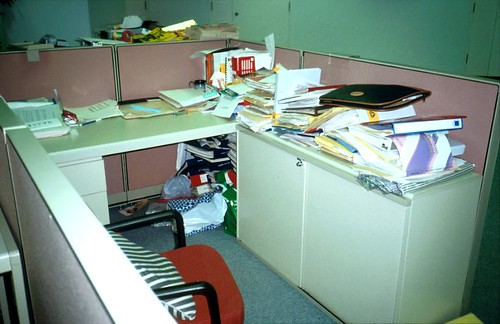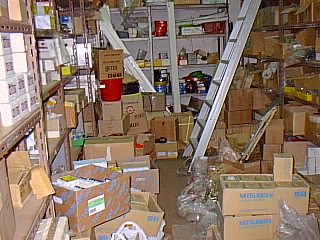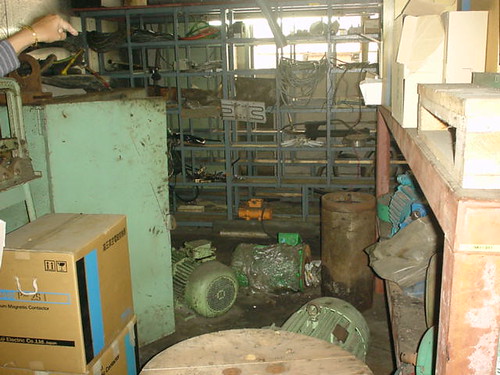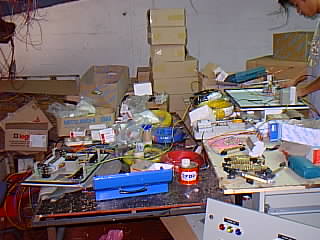Thug (menacingly): Where’s the stuff? Hand it over quickly! (presumably referring to drugs)
Young man: I don’t know.
Thug gets impatient and repeats question:
Young man (in exasperated voice): I don’t know. I really don’t know.
And then the camera zooms out and we see the young man’s room is in a complete mess with things strewn all over the place. And the message from the advertisers says: "Storage problems?" ..… I think you can guess what they are selling.
I love this advertisement. It’s funny and it brings across so graphically the basic message of 5S, which is:
Good housekeeping makes it easier to find things and thus improves productivity.
But what happens when you get to the workplace?
Over the past 20 years, I have amassed literally thousands of photos of cluttered, messy and dirty workplaces. Most of the time, people know that it is important to practise good housekeeping, but they are too busy and have ‘no time’. Unfortunately, these people will wait till a crisis arises before they try to put their house in order; such as in the event of an accident, or a warning from the authorities or an impending visit by their customer. In other words, they think that housekeeping is important but not urgent. We will do it when we have time. But the longer you delay, the dirtier the place becomes and the more difficult it is to put right.
In his outstanding book, The Seven Habits of Highly Effective People, Steven Covey says that a highly effective person is one who is 'proactive' and 'puts first things first'. He distinguishes tasks that are urgent but not important, from those that are important but not urgent, and consciously sets aside time for the latter. Good housekeeping, or what we call 5S belongs to the second category. My Japanese teacher, Mr Motomu Baba puts it differently; "Do fire-preventing, not fire-fighting."
So take a good look at your workplace. Is it like the photos below? If it is, in Steven Covey’s book, you are not creative but ineffective.




5 comments:
On Labour Day my family wanted to eat Indian Muslim food for lunch and the nearest place was at Jln Leban, upper Thomson Road. We saw the popular Prata shop was packed to capacity, So we went to the next shop with less people. While eating, I noticed the owner of a seven-eleven type of shop next door happily serving a few customers with fruits from a large fridge outside his shop. Later we went into his shop to buy some sundry items. I was very impressed with the owner of this shop. If Chun See were to be there, he would have taken some photos of the shop that has good layout, clever display of his goods, and overall cleanliness. He may have copied the NTUC fair-price ways of doing things. Still I admire him because he is a one-man-operator. He acts as a cashier, a saleman, a sundry worker and a cheerful boss, all rolled into one. He is able to do this, because he is unknowingly practising 5S principles of good house-keeping.
The recycling movement is now pretty strong in Singapore, because many waste products can be sold for money like old newspapers, clothings, electrical appliances, steel/aluminium articles and the likes. The disposal of these items are not much of a problem, provided owners of such items take trouble to pack them nicely and place them at appropriate places for cleaners to collect. As a result, owners practising good house-keeping, while cleaners and junk-collectors are able to carry out their jobs with less hazzle, making some extra money . Isn't such a practice good for everyone?
By looking at Chun See's pictures of bad 5S practice, we should know why many fires occurred at SME workshops.
Actually, many of the big co's just as bad.
Actually, there is a lot of psychological information that can be obtained just by looking at a person's desk.
There are the powerful CEO types...whose tables are often clear of clutter,only the bare essentials. They may not even have items from home, such as a photography from home, or stuffed toys or decor ornaments. So, they reveal very little about their private life and you can be sure that they are very objective and get things done very quickly.
Then, of course, there are those who clutter their desk with notes, books, publications etc. More or less, you can sense that they are the insecure type...who need all the information on hand before they make decisions etc.
Nevertheless, clutter is still seen to be unsightly and undesirable. It hampers productivity as time is oftne lost trying to find the file that you need of or that very important document for an urgent meeting.
Post a Comment